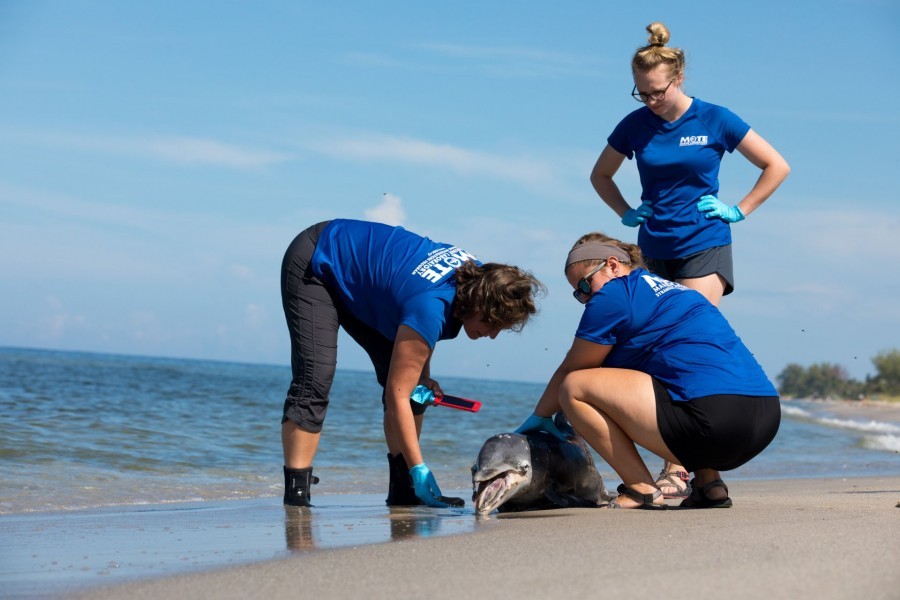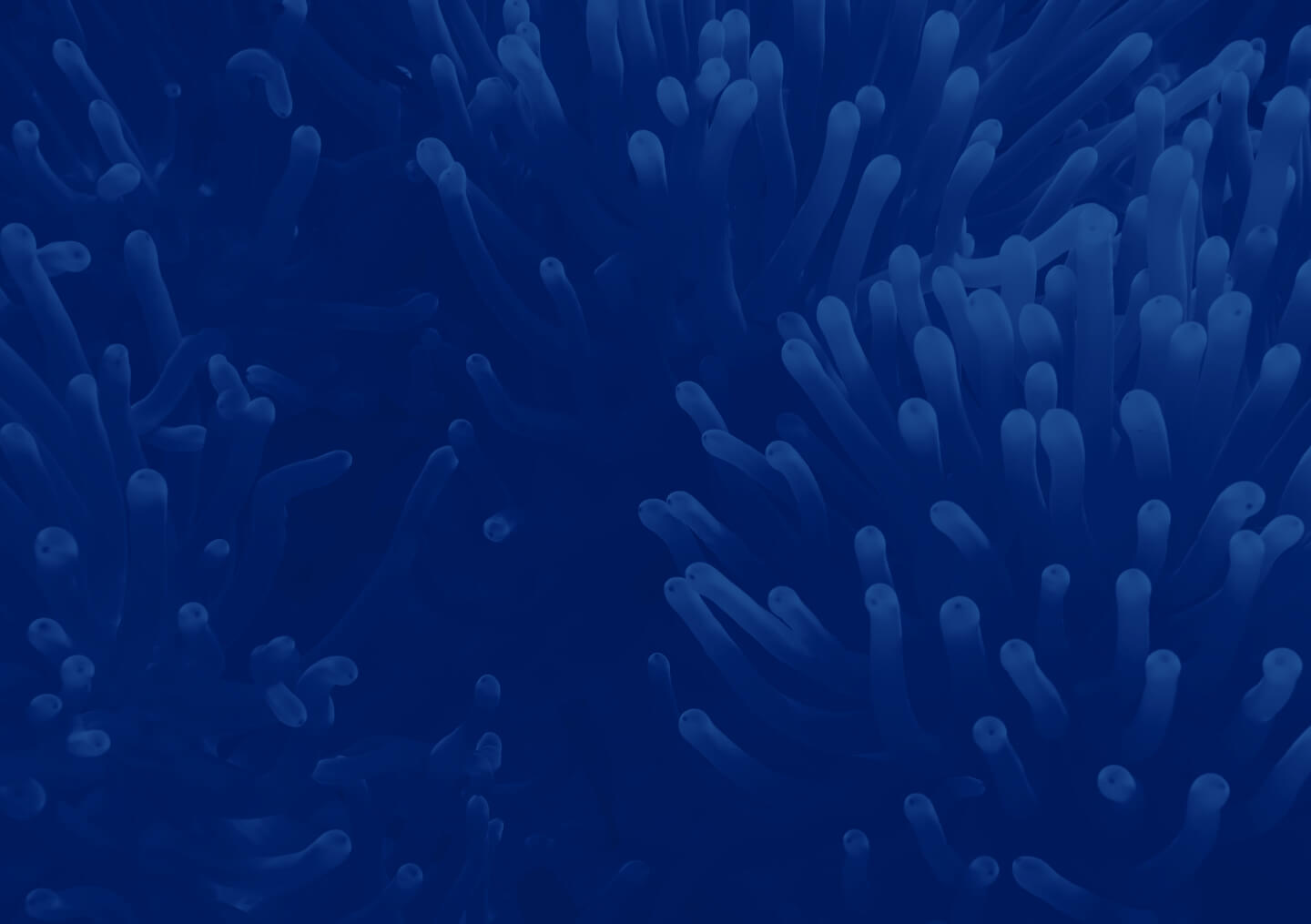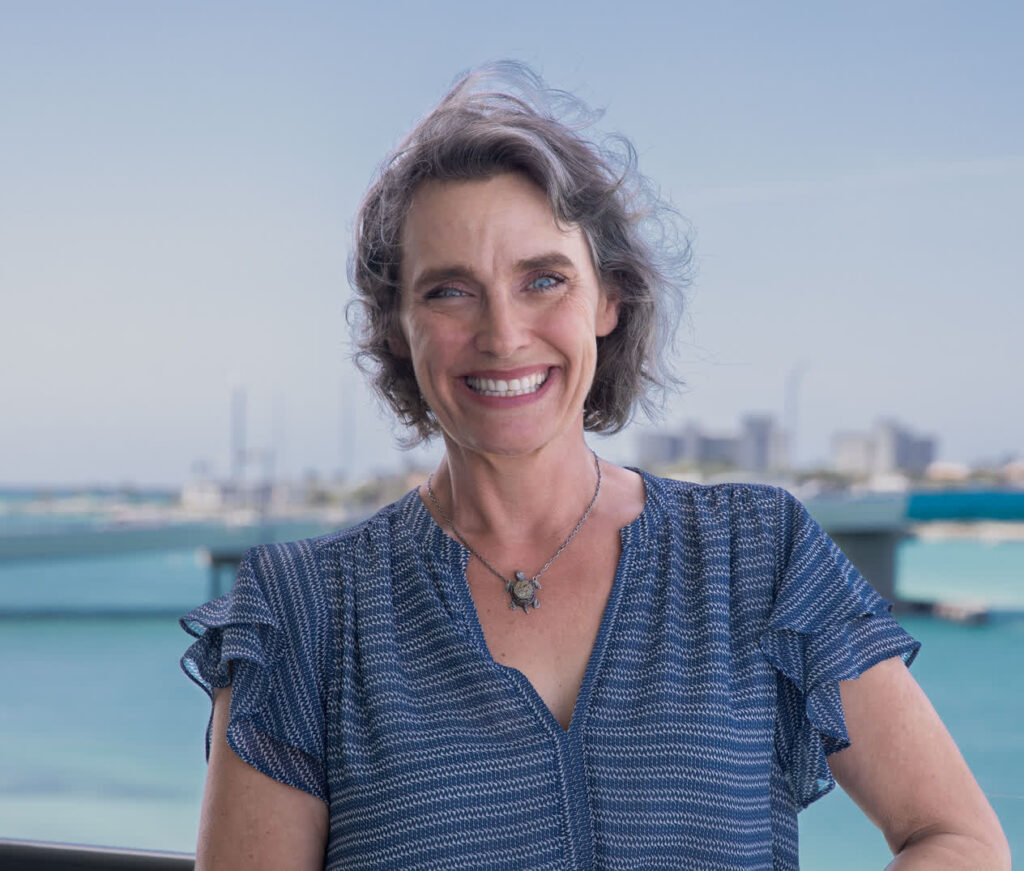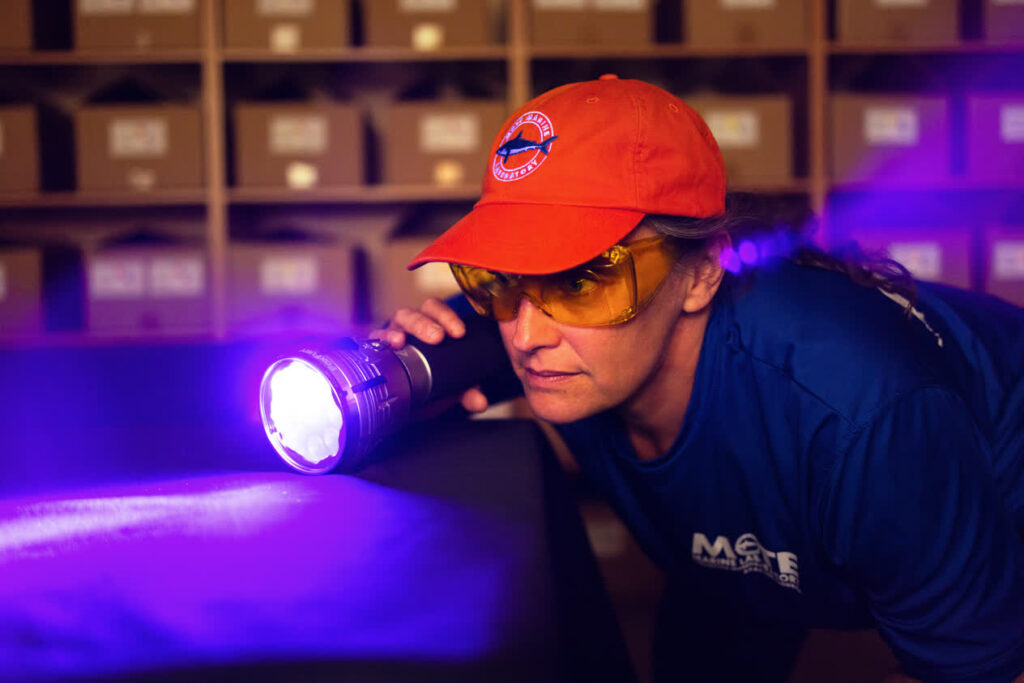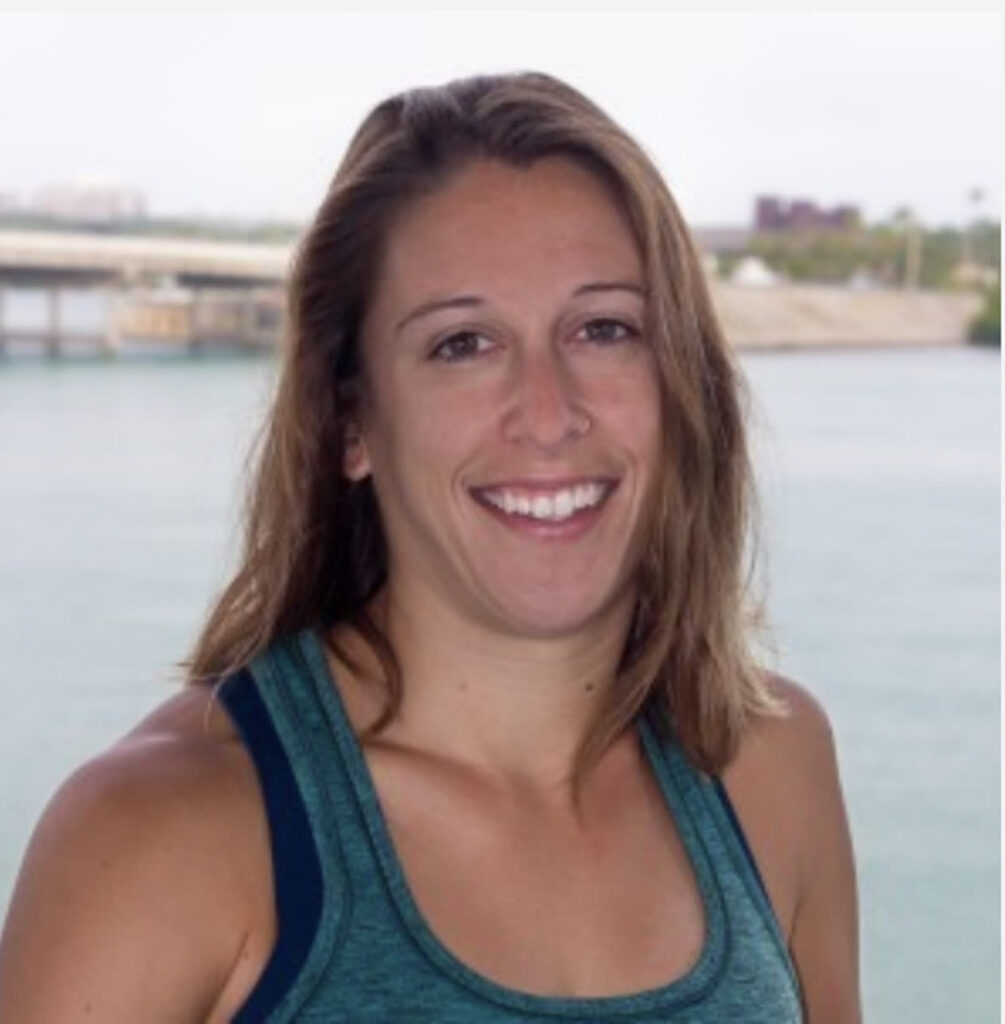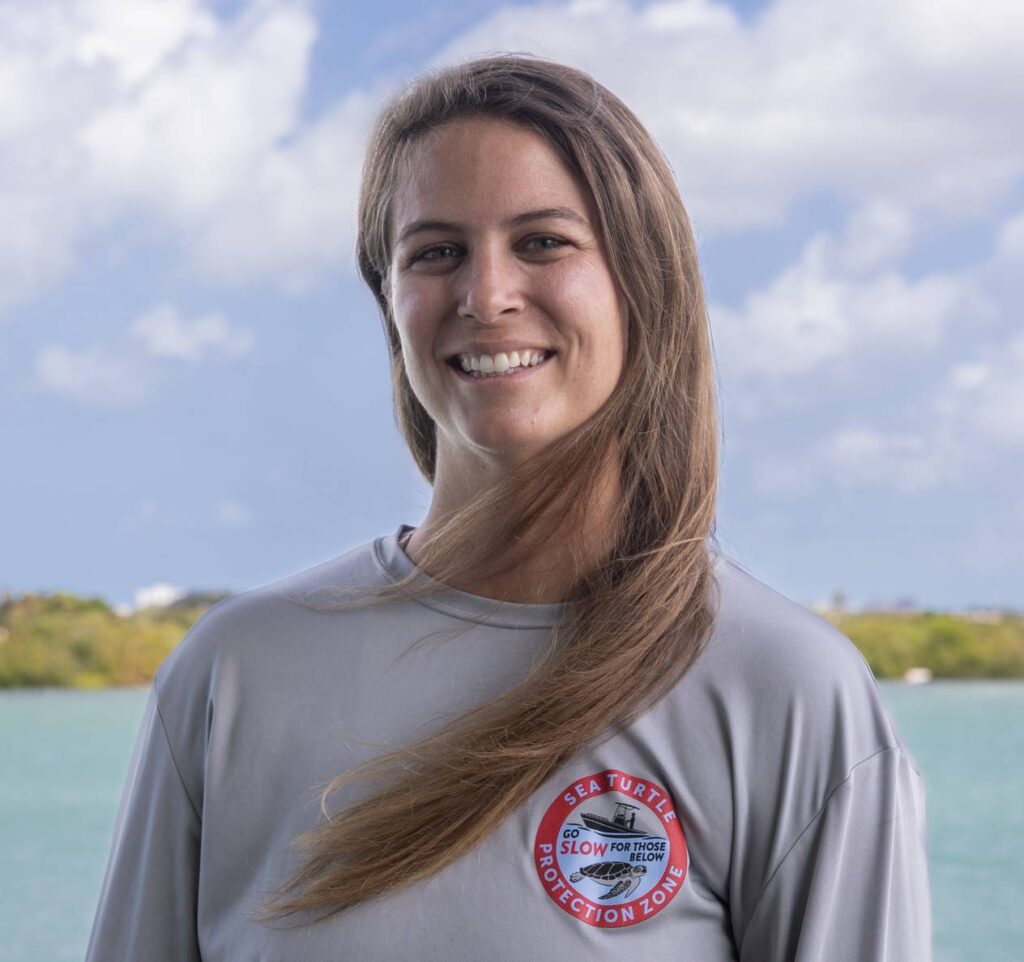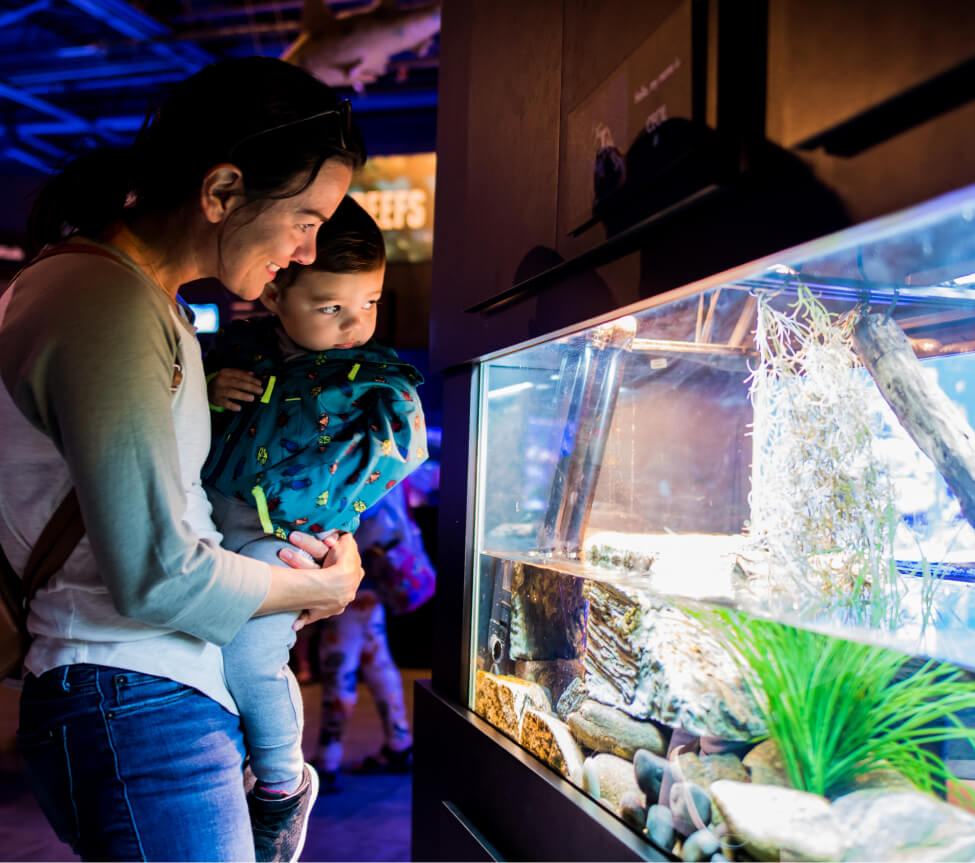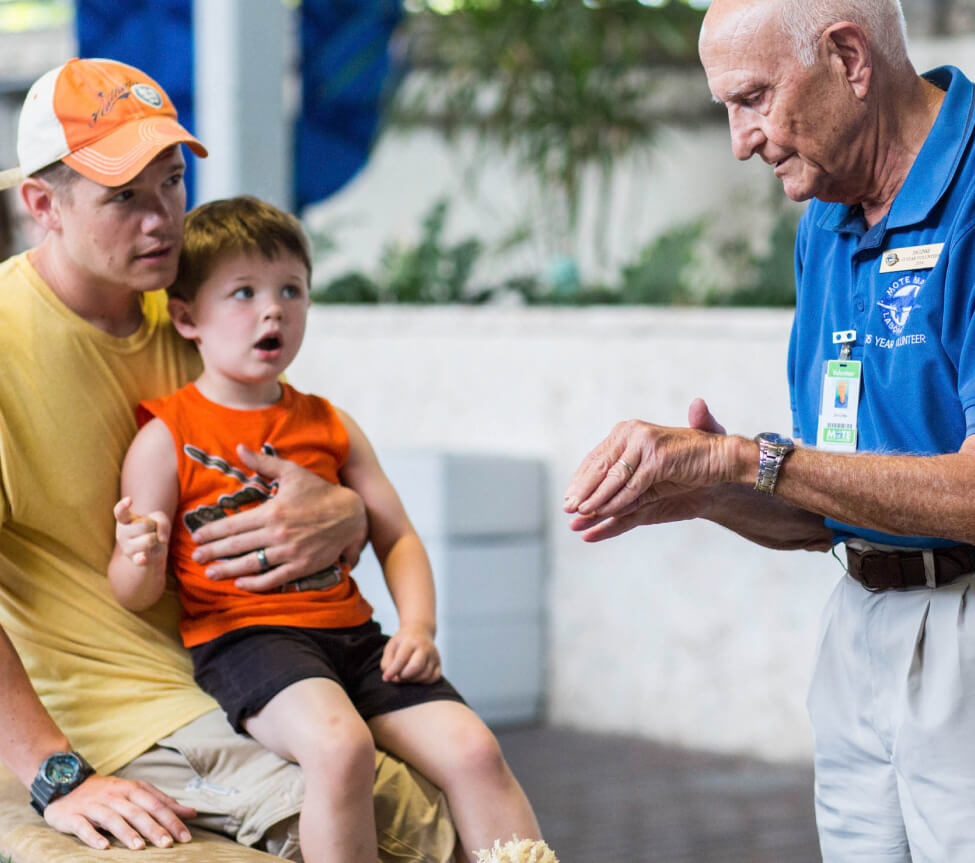
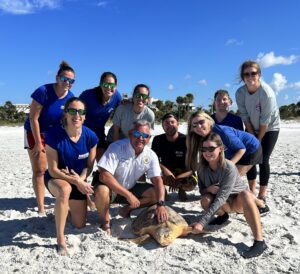 To report a stranded dolphin, whale, manatee or sea turtle (dead or alive) within coastal Southwest Florida, please call the Stranding Investigations Program’s 24-hour hotline:
To report a stranded dolphin, whale, manatee or sea turtle (dead or alive) within coastal Southwest Florida, please call the Stranding Investigations Program’s 24-hour hotline:
888-345-2335
Find other wildlife-friendly tips learn about the Sea Turtle Protection Zone in Sarasota Bay, Florida:
The Stranding Investigations Program provides 24-hour response to sick, injured and deceased marine mammals and sea turtles within the coastal waters of Southwest Florida, mainly in Sarasota and Manatee counties. The program also offers logistical support to state biologists in the verification and rescue of sick, injured or deceased manatees, an endangered species living in Florida’s coastal waters.
Stranded cetaceans (whales and dolphins) and sea turtles are recovered and transported to Mote. Most calls are for deceased animals. In those cases, SIP staff performs detailed post-mortem examinations known as necropsies (animal autopsies). The information gathered during necropsy helps to evaluate the long-term mortality trends of these species, especially as it relates to pathology or human-related activities. Such research data are crucial to species management and conservation.
In the case of live-stranded sea turtles, SIP works with Mote’s Sea Turtle Rehabilitation Hospital for treatment with the goal of release. For live-stranded mammals, SIP works with state and federal agencies to determine the best course of action for each situation, often collaborating with rehabilitation-and-release partners.
The Stranding Investigations Program has been involved in sea turtle strandings since 2003 and has recovered more than 2,000 turtles during that time. Seven species of sea turtles are found globally, and five of the species are found in the Gulf of Mexico. The Program has responded to strandings of each of these five species as part of the Sea Turtle Stranding and Salvage Network authorized through the Florida Fish and Wildlife Conservation Commission. The Program also works closely with Mote’s Sea Turtle Rehabilitation Hospital and its Sea Turtle Conservation and Research Program. Many of these efforts have been supported in part by grants awarded from the Sea Turtle Grants Program, which is funded by sales of the Florida Sea Turtle License Plate (www.helpingseaturtles.org).
Mote Marine Laboratory has been providing stranding support for cetaceans since 1969, when they attempted rescue of dolphins during a mass stranding off Sarasota. The Stranding Investigations Program was formally established in 1985 and, since then, Mote staff have responded to more than 780 cetacean strandings of 19 species.
The Program is a member of the Southeastern U.S. Marine Mammal Stranding Network, a group of marine animal rescue organizations under the direction of NOAA’s National Marine Fisheries Service.
At Mote, the Stranding Investigations Program works closely with the Sarasota Dolphin Research Program, which studies the lives of bottlenose dolphins in Sarasota Bay as part of the world’s longest-running study of a wild dolphin population. In this way, the Strandings Program helps uncover the causes of death for animals closely studied during their lives and plays a crucial role in wider species conservation.
Following the necropsy of the recovered cetaceans, the bones are cleaned, examined and catalogued in the Ruth DeLynn Osteological Collection at Mote. This curated collection, accredited by the American Society of Mammalogists, catalogues the bones of dolphins and whales and is available for study by qualified researchers.
Combined, these efforts illuminate these protected species’ way of life and provided crucial information about their causes of death.
Program Details
- Digitizing of the Ruth DeLynn Cetacean Osteological Collection
- Food habit studies of stranded dolphins and sea turtles
- Cause of mortality in cetaceans stranded near Sarasota County
- Dolphin/stingray interactions in Sarasota Bay
- Identifying vessel-strike prone areas for sea turtles along Sarasota’s inshore coastline: a spatial and temporal analysis
- Comparing boat-strike characteristics among different species of sea turtles in Sarasota and Manatee counties
- Effects of the COVID-19 pandemic on human interaction in stranded dolphins
- Prevalence and prognosis of trauma-related kyphosis in stranded green sea turtles (Chelonia mydas)
The Stranding Investigations Program regularly supports graduate and undergraduate research through our internship program. Since 2009, at least 20 former SIP interns have acquired paid positions working in a related field, and at least 17 former interns have obtained or are currently pursuing graduate or veterinary degrees.
Current funding:
- Sarasota County for rapid removal and examination of stranded sea turtles and marine mammals in Sarasota County
- Manatee County for marine mammal stranding response in Manatee County
- Florida Fish and Wildlife Conservation Commission for manatee rescue and verification in Manatee and Sarasota Counties
- NOAA Fisheries John H. Prescott Marine Mammal Rescue Assistance Grant Program for rapid detection and response to cetacean mortalities, capacity building for large whale response, small cetacean disentanglement, training and forensics
- National Fish and Wildlife Foundation Gulf Environmental Benefit Fund
- Analysis of brevetoxin levels in tissues from stranded animals by Dr. Leanne Flewelling at Florida Wildlife Research Institute
- Histological analysis of stranded animals by the College of Veterinary Medicine, Zoological Pathology program at the University of Illinois at Urbana-Champaign
- Ongoing monitoring of Sarasota Bay dolphin population and coordination of local rescues with Dr. Randall Wells of Chicago Zoological Society’s Sarasota Dolphin Research Program based at Mote Marine Laboratory
- Genetic and stable isotope analysis of stranded cetaceans with Dr. Deborah Duffield at Portland State University
- Providing ongoing data and samples to the National Oceanic and Atmospheric Administration (NOAA) and Florida Fish and Wildlife Conservation Commission (FWC) for projects such as a stock structure and spatiotemporal analyses
Get Wildlife Friendly Tips and more
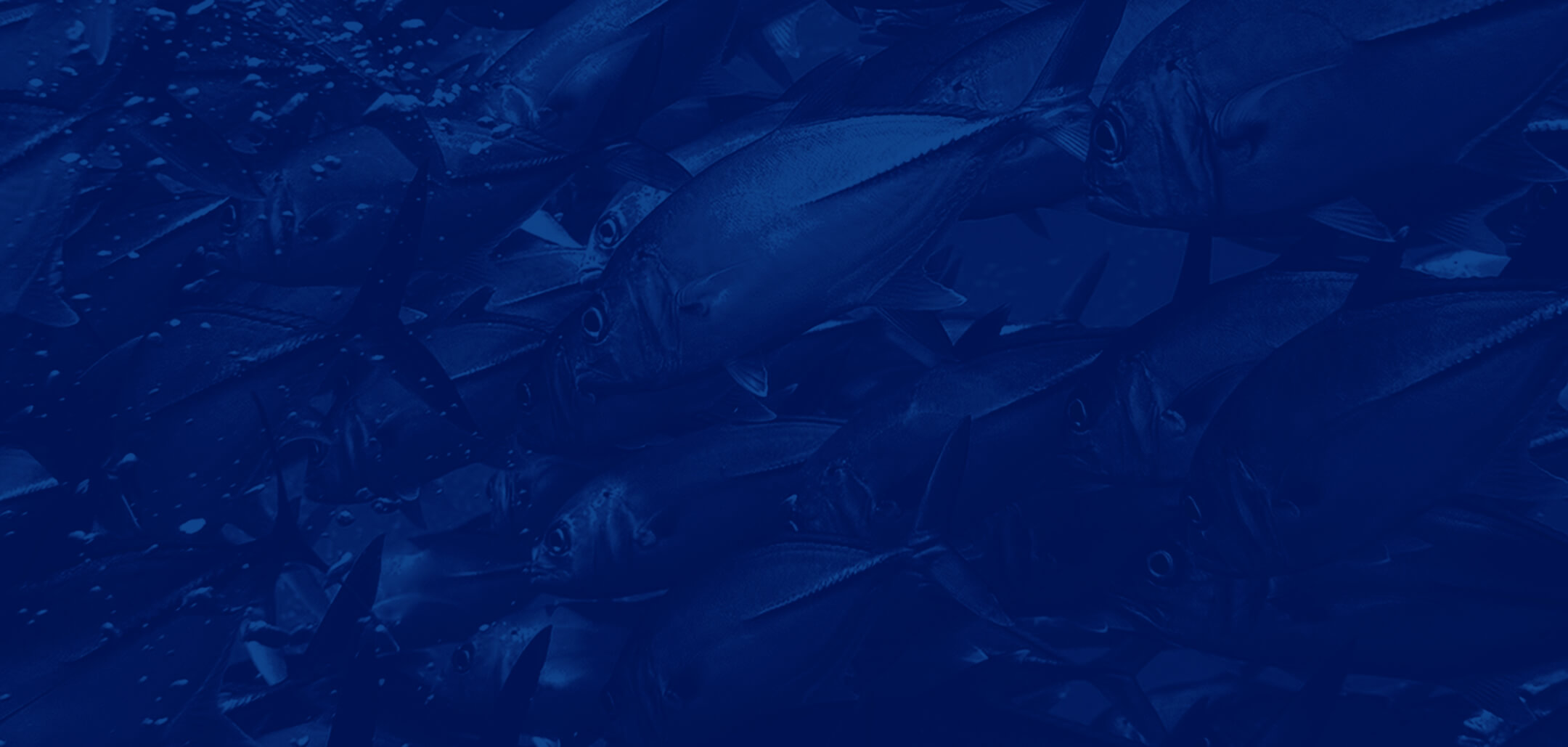
Stranding Investigations Program Team
Additional Program Information
- Barratclough, A., McFee, W. E., Stolen, M., Hohn, A. A., Lovewell, G. N., Gomez, F. M., Smith, C. R., Wells, R. S., Parry, C., Daniels, R., Ridgway, S. H., & Schwacke, L. How to estimate age of old bottlenose dolphins (Tursiops truncatus); by tooth or pectoral flipper? Frontiers in Marine Science, 10, 1135521. https://doi.org/10.3389/fmars.2023.1135521.2023
- Bowens-Stevens, S.R., Gannon, D.P., Hazelkorn, R.A., Lovewell G.,Volker, K.M., Smith, S., Tumlin, M.C., and J. Litz. Diet of Common Bottlenose Dolphins, Tursiops truncatus, that stranded in and Near Barataria Bay, Louisiana, 2010-2012. Southeastern Naturalist, 20 (1) 117-134, 2021.
- Kincaid, A.L.D., Lovewell, G.N., Allen, J.B., Bassos-Hull, K., Blackburn, J.L., Hazelkorn, R.A., and R.W. Wells. Necrocoitus in Common Bottlenose Dolphins (Tursiops truncatus) near Sarasota, Florida. 2022 Aquatic Mammals 48 (6) 693-701. DOI 10.1578/AM.48.6.2022.693
- McHugh, K. A., Barleycorn, A.A., Allen, J.B., Bassos-Hull, K., Lovewell, G., Boyd, D., Panike, A., Cush, C., Fauquier, D., Mase,B., Lacy, R.C.,Greenfield, M.R., Rubenstein, D.I., Weaver, A., Stone A., Oliver, L., Morse, K., and R.S. Wells.Staying Alive: Long-Term Success of Bottlenose Dolphin Interventions in Southwest Florida. Frontiers in Marine ScienceVol 7. https://www.frontiersin.org/article/10.3389/fmars.2020.624729, DOI=10.3389/fmars.2020.624729, January, 2021.
- Moncada, F., Nodarse, G., Valido, L., Byrd, L., Lovewell, G., Blackburn, J., and A.DL. Kincaid. Juvenile Loggerhead (Caretta Caretta) Head-started in Cuba Recaptured in Florida. Marine Turtle Newsletter, 163:15-17, 2021.
- Powell, JWB, Duffield, DA, Kaufman, JJ, Luo, G, Lovewell, GN, McFee, WE. Bone mineral density of the common bottlenosedolphin radius: A primary skeletal site for clinical bone densitometry and preliminary descriptive data set using archival specimens. Mar Mam Sci. 2021; 37: 374–384. https://doi.org/10.1111/mms.12769
- Hazelkorn, R.A., Wells, R.S., Siders, Z.A., DeLynn, R.E., and G.N. Lovewell. Physical maturity in common bottlenose dolphins(Tursiops truncatus) from Sarasota Bay, Florida. Marine Mammal Science, Vol 36, No 4, pp 1309-1321. https://onlinelibrary.wiley.com/doi/10.1111/mms.12733. October 2020
- Christiansen, F., McHugh, K.A., Bejder, L., Siegan, E.M., Lusseau, D., McCabe, E.B., Lovewell, G., and R.S. Wells. Food provisioning increases the risk of injury in a long-lived marine top predator. Royal SocietyPublishing, open sci. 2016 3 160560; DOI: 10.1098/rsos.160560. Published 21 December 2016
- Colegrove, K.M, Venn-Watson, S., Litz, J., Kinsel, M.J., Terio, K.A., Fougeres, E., Ewing, R., Pabst, D.A., McLellan, W.A., Raverty, S., Saliki, J., Fire, S., Rappucci, G., Bowen-Stevens, S., Noble, L., Costidis, A., Barbieri, M., Field, C., Smith, S.,Carmichael, R., Chevis, C., Hatchett, W., Shannon, D., Tumlin, M., Lovewell, G., McFee, W., and T.K. Rowles. Fetal distress and in utero Brucellapneumonia in perinatalbottlenose dolphins (Tursiops truncatus) during the Northern Gulf ofMexico unusual mortality event: 2010 through 2013. DOA 119:1-16, April 2016
- Servis, J.A., Lovewell, G.N., and A.D. Tucker. Diet analysis of subadult Kemp’s ridley (Lepidochelys kempii) turtles from West-Central Florida. Chelonian Conservation and Biology. Vol. 14, No 2, pp173-181. December 2015
- Venn-Watson S., Colegrove K.M., Litz, J., Kinsel M., Terio K., Saliki J., Fire S., Carmichael R., Chevis, C., Hatchett W., Pitchford J., TumlinM., Field C., Smith S., Ewing R., Fauquier D., Lovewell G., Whitehead H., Rotstein D., McFee W., Fougeres E., and T. Rowles. Adrenal gland and lung lesions on Gulf of Mexico common bottlenose dolphins (Tursiops Truncatus) found dead following the Deepwater Horizon oil spill. PLoS ONE 10(5): e0126538. doi:10.1371/journal.pone.0126538dol:10.1371/journal.pone.0083645. 2015
- Wells, R.S., Allen, J.B., Lovewell, G.N, Gorzelany, J., Delynn, R.E., Fauquier, D.A., and N.B. Barros. 2014. Carcass-recovery rates from resident bottlenose dolphins in Sarasota Bay, Florida. Marine Mammal Science, Vol. 31. No 1, pp 355-368. January 2015
- Delynn, R. A., Lovewell, G. N., Wells, R. S., and Early, G. Congenital Scoliosis in a Bottlenose Dolphin. Journal of Wildlife Diseases 41:4 979-983 October 2011
- Begeman, L., St. Leger, J. A., Blyde, D. J., Jauniaus, T.P., Lair, S., Lovewell, G. N., Raverty, S., Seibel, H., Siebert, U., Staggs, L., Martelli, P., and Keesler, R. I. Intestinal volvulus in cetaceans. Veterinary Pathology 50:4 590-596 July 2013
- Amaral, A. R., Lovewell, G., Coelho, M.M., Amato, G., and Rosenbaum, H.C. Hybrid speciation in a marine mammal: the Clymene dolphin (Stenella clymene). PLoS ONE 9(1): e83645. dol:10.1371/journal.pone.0083645

